
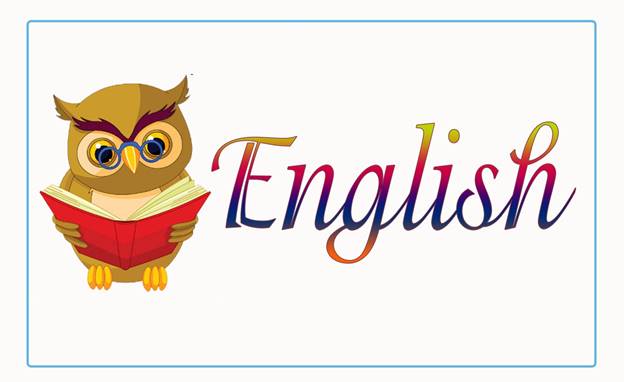
Цель: способствовать развитию интереса учащихся к культуре стран изучаемого языка
1Развивать коммуникационные умения: чтение,говорение, письмо.
2. Развивать мотивы учебной деятельности.
Оборудование : иллюстрации по теме урока.
I.Организационный момент
-Good morning, boys and girls! (Good morning)
- How are you ?( Fine,thank you!...)
Let us see if everyone is here
II.Актуализация знаний.
(Учитель озганизует проверку выполнения домашнего задания.
III. Работа по теме урока :
1.Работа по учебнику
Today we are going to learn some English idioms and sayings about food
На доске прикреплена картинка с изображением еды
После этого учитель задает вопросы классу:
Do you know Russian idioms & what they mean .Give the examples
You can't learn to parse English idioms, you can only learn them. Although some English idioms have analogues in Russian (for example, "take the bull by the horn" literally translates as "take the bull by the horns" and has the same meaning), and their meaning is clear, yet many English idioms have no analogues in Russian. Sometimes it is not difficult to guess the meaning of the phraseological unit, although in Russian the same idea would most likely be expressed differently. For example, the English phraseology "get up on the wrong side of bed" literally means "get up on the wrong side of the bed", and it is not difficult to understand its meaning, taking the Russian phraseology "get up on the wrong foot"as an analogy. However, such cases are rather exceptions, and, as already mentioned, most of the English idioms and phraseological units are not literally legible. For example, without knowing in advance what the phrase "wear more than one hat" means, you can get into a mess by hearing it in a speech or seeing it on a letter, and starting to translate
Учитель показывает карточки с картинками продуктов
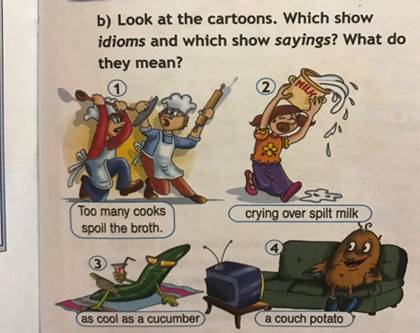
How can you understand the pictures.
Do you know the difference between idiom and saying?
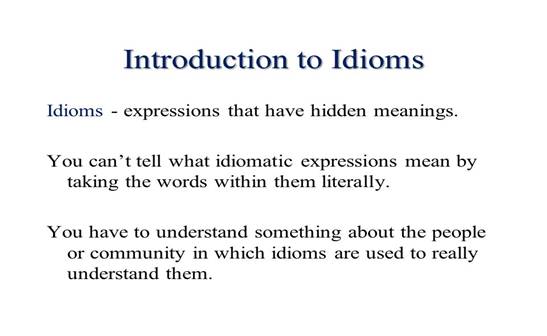
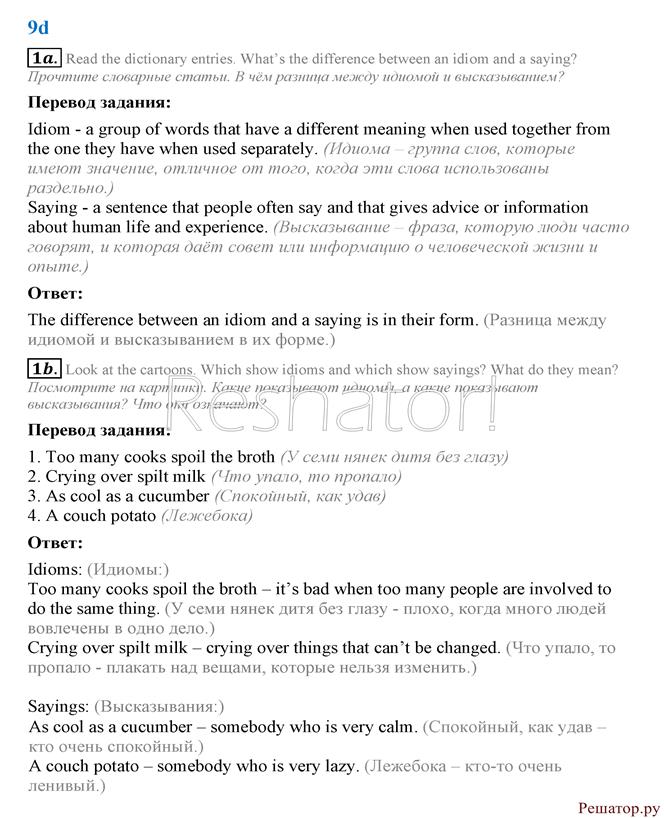
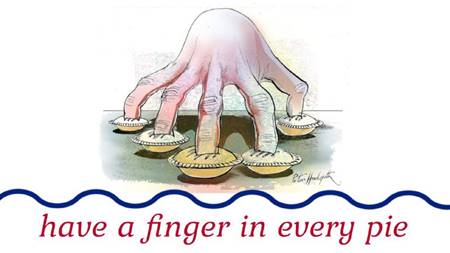

Choose an idiom to match the picture
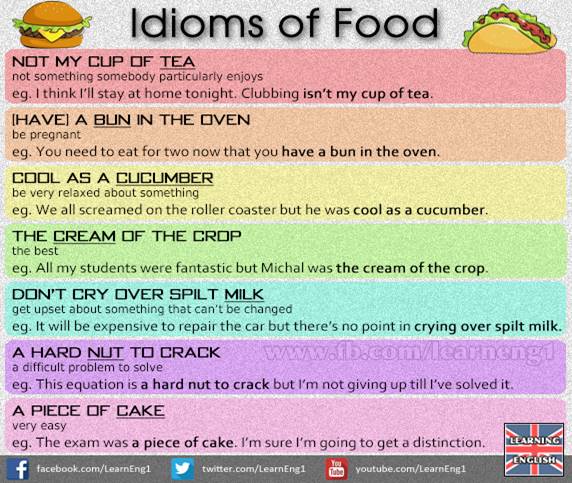
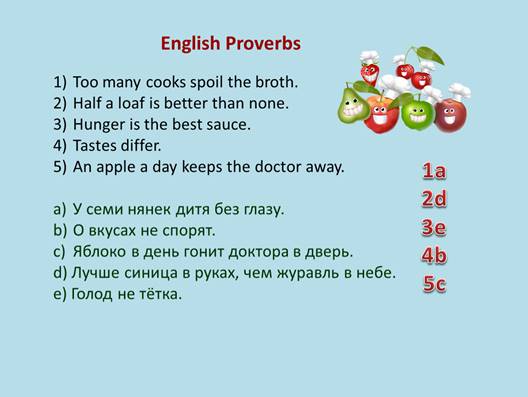
2.Учащиеся выполняют упражнения,направленные на отработку лексических единиц
упр 3а стр 91
Учащиеся читают текст и отвечают на вопрос задания
Идиома: a hot potato разг.
Перевод: щекотливый, спорный вопрос; острый вопрос; щекотливая тема
Пример:
The issue of part-time workers is a hot potato that we must deal
with.
Вопрос
с рабочими, работающими на неполную ставку, очень щекотливый, и мы должны
решить его.
Идиома: a piece of cake
Перевод: пара пустяков; пустяковое дело
Пример:
That job was a piece of cake. It was the easiest thing that I
ever did.
Эта
работа была пустяковым делом. Это было самое легкое, что я когда-либо делал.
Идиома: bread and butter
Перевод: хлеб насущный; основной доход, заработок, средства к существованию
Пример:
We sell a variety of parts, but the oil filter is our bread and
butter.
Мы
продаем разные запчасти, но масляный фильтр – наш основной заработок.
Teaching at the local school is his bread and butter.
Преподавание
в местной школе обеспечивает ему средства к существованию
selling like hot cakes-selling large amounts very quickly
раскупаются как горячие пирожки, берутся нарасхват
The baseball game was supposed to be on Saturday and the tickets for it were selling like hotcakes.
a bad egg- a bad person
плохой человек, лодырь, бездельник
My cousin Jack is a bad egg, and I don't want to have anything in common with him
as easy as pie- very easy проще простого
full of beans
быть в приподнятом настроении, быть оживленным
my cup of tea- smth I generally like
saying- an apple a day keeps the doctor away
кто яблоко в день съедает, у того врач не бывает
saying-you can't have your cake and eat it too-. на двух стульях не усидишь
Have a finger in every pie
For information about the activities in this town, you should talk to John Brown. He‘s got a finger in every pie.
Чтобы узнать о событиях в городе, поговорите с
Джоном Брауном. Он в курсе всего
● Not my cup of tea (дословно
– не моя чашка чая)
Когда
мы говорим: “it is not my cup of tea”, мы имеем
в виду, что это нам не по вкусу, не нравится или неинтересно.
Most of my colleagues go for a drink after work on Fridays, but going to pub is not my cup of tea.
Большая
часть моих коллег после работы в пятницу ходят выпить, но хождение по барам мне
не по вкусу.
Jazz really isn’t my cup of tea, I prefer hard rock.
Джаз
мне не по вкусу, я предпочитаю тяжёлый рок.
● The icing on the cake (дословно –
глазурь на торте)
The icing on the cake означает
дополнительное преимущество, нечто, что дает дополнительный плюс и
так хорошему продукту или ситуации.
I love my new job – the people, the responsibilities, the salary. The fact that they’ve given me a great car is just the icing on the cake.
Я
в восторге от своей новой работы – люди, обязанности, зарплата. То,
что мне выдали классную машину
– дополнительный плюс.
He was delighted to have his story published – getting paid for it was just icing on the cake.
Он
был рад, что его рассказ опубликовали. А то, что ему ещё и заплатили, стало
приятным сюрпризом.
● A big cheese (дословно –
большой сыр)
A big cheese означает
важная персона, большая шишка.
He was a really big cheese in the business world.
Он
был большой шишкой в мире бизнеса.
Apparently her father is a big cheese in one of the major banks.
Её
отец, похоже, – большая шишка в одном из главных банков.
3.Выполнение задания на доске
- Complete the sentences with an idiom or use a proverb
( На интерактивной доске написаны предложения )
1.My aunt is....today.She must be excited about smth.
2.Jake was....when his canoe turned over in the river.What a brave man!
3.My roommate is such..... . Last weekendhe watched TV for 10 hours on end.
4. There is no use ....and we should not worry about what happened in the past/
5.There were 4 people trying to fix the broken air conditioner but.... and there were too many people to do a good job.
( Keys : 1-Full of beans,2-as cool as a cucumber 3- a couch potato 4-crying over spilt milk
5- tooo many cooks spoil the broth)
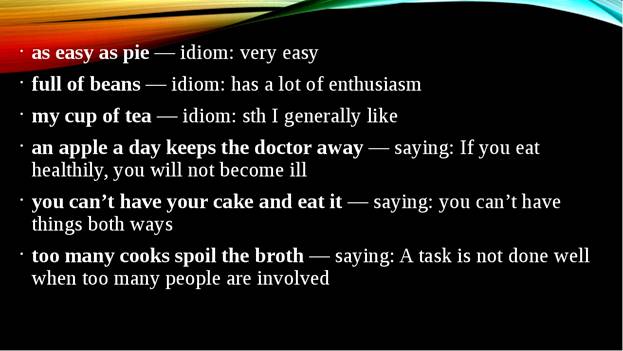
IV.Актуализация изученной лексики.
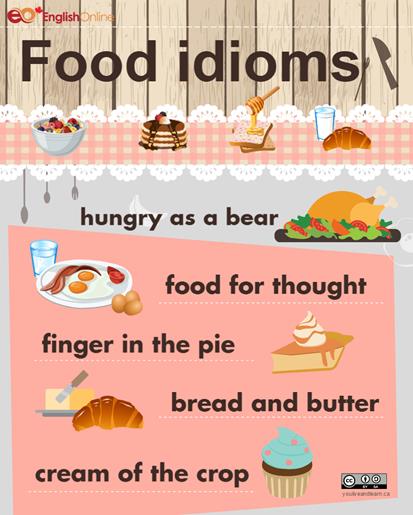
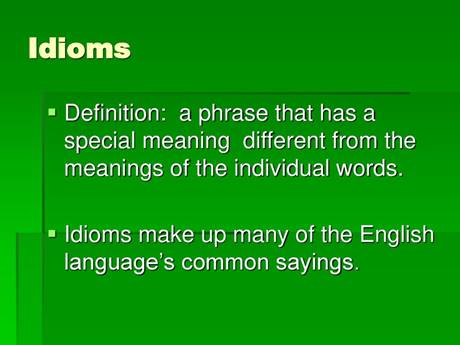
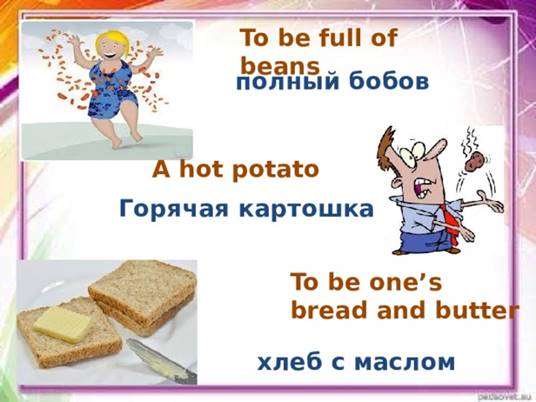
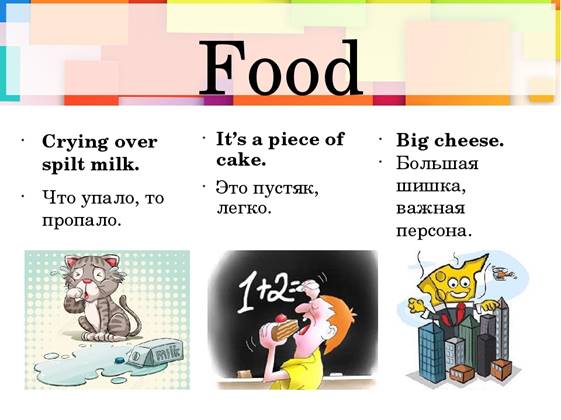
3.Продолжение работы по учебнику :
Упр4 стр 91
-Think of the situations where you can use the idioms or sayings about food/ The pictures will help you . Use them.
Ученики слушают объяснения учителя,затем выполняют самостоятельно упражнения из учебника на понимание материала.
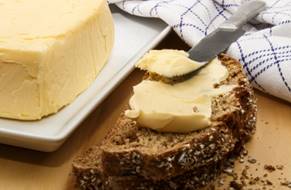
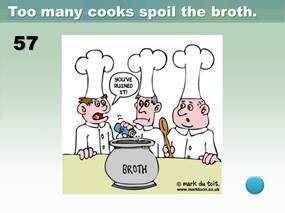
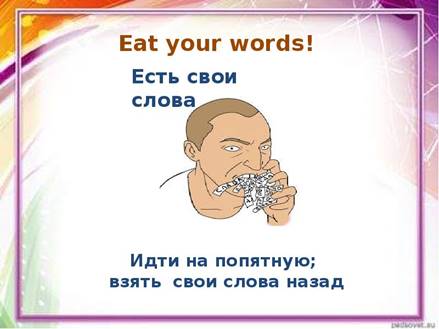
V. Инструктаж по выполнению домашнего задания.
-Do you know any other English idioms saying & proverbs about food ?
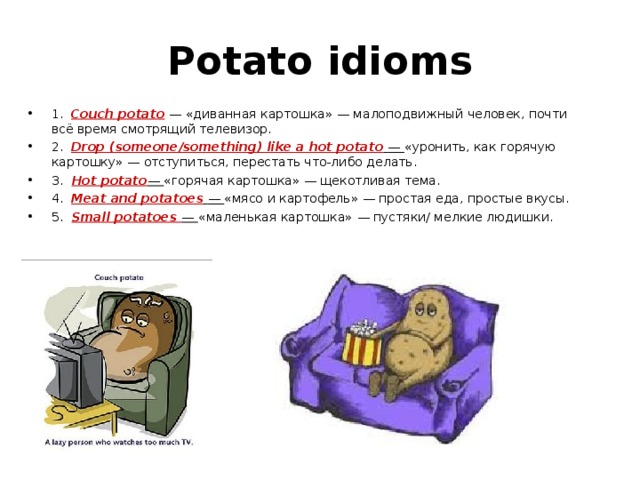
( Учитель объясняет, как выполнять задания в рабочей тетради.)
- If there is anything you do not understand, ask now .
( Учитель записывает домашнее задание на доске , а ученики -в дневниках )
Ex 1-2 p91
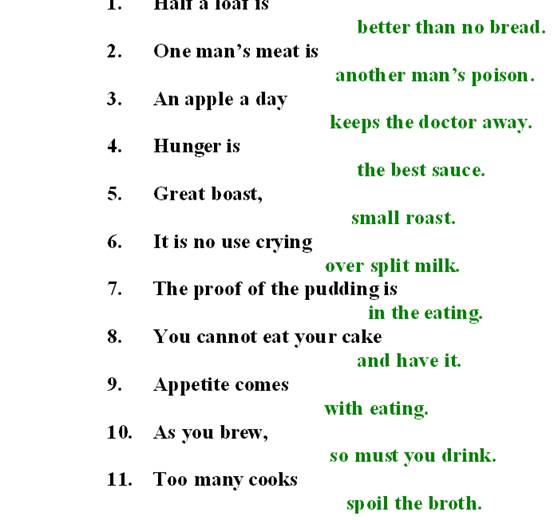
VI.Подведение итогов урока.
-Can you use English idioms saying & proverbs about food?
Учитель щценивает работу учащихся на уроке.
That 's all for today.Good bye !
Thank you for the lesson!

Скачано с www.znanio.ru
Материалы на данной страницы взяты из открытых источников либо размещены пользователем в соответствии с договором-офертой сайта. Вы можете сообщить о нарушении.